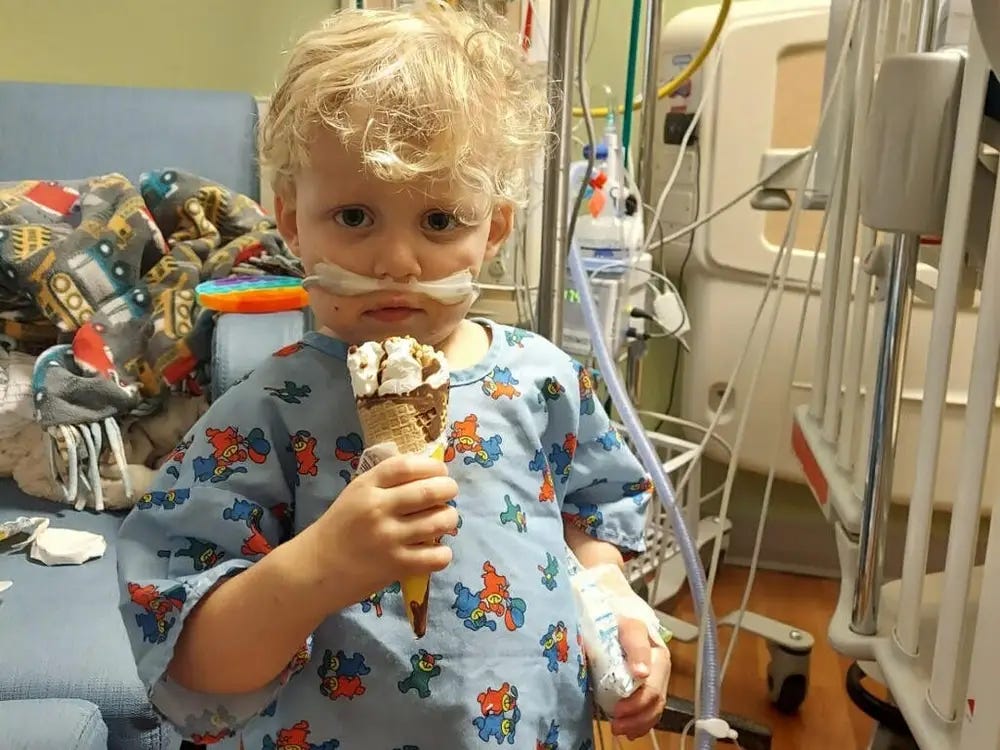If everything's trauma is nothing trauma?
On "enshittified" language and writing for Business Insider
Out 12.9.25, and available for PRE-ORDER now!
I hate the word trauma
Even though I believe that naming our traumas can be healing.
Mostly, I hate the word because it’s become so pervasive. As Kathryn Jezer-Morton writes, the word trauma (along with so many other mental health-adjacent terms) has become enshittified. She writes,
What starts as a useful concept for those who need a term to describe their experiences is inevitably appropriated and misused by people who mostly just want to attract and keep people’s attention on social platforms.
Ultimately, enshittified ideas are pressed into the service of selling garbage: MLMs, fake courses, snake-oil wellness programs. Cycle breaking becomes a cash cow. […] Now, cycle breaker, meant to describe an arduous process of extricating oneself from patterns of behavior that threaten you with their dangerous undertow, is being used to describe the decision to no longer say, “I don’t care who started it” to your kids, or force them to eat every morsel on their plate
This is what I believe has happened with the word trauma. Trauma is real — but if anything is traumatic, then nothing is. Trauma is subjective, and one’s experience of trauma wouldn’t necessarily be another person’s experience of trauma — but, really, is being stuck in traffic traumatic?
Because the word is widely used, it’s been misused.
I believe that our inability to persuade often stems from our reliance on stale language.
People glaze over. They hear the word trauma, and they think they’ve heard all this before.
But have they? If you’re a writer, one of your tasks is to command attention. To make someone pause. To take an experience others think they understand and make them see it anew.
⭐Here’s a prompt if you, too, hate the SEO words of our lives ⭐
What buzzword makes you cringe? Trauma? Gaslighting? Trigger? What new, fresh language could you use to describe the experience instead? This may not help you with SEO, but it can help you in your writing.
Our metaphors color our ability to interpret our experiences. We invoke many metaphors in our lives. Time is money (we save it and spend it). Life is a journey (we take paths, walk roads, experience detours).
But we don’t have to use metaphors in this way. We don’t have to use money language to talk about time; we could, instead, invoke a garden. And we don’t have to talk about our lives as a journey. Maybe it could be a swim in the ocean. Or a theatrical play.
When we switch out the metaphor, we can see a concept with a fresh, unique lens. If you feel like your discussion of an experience is stale, change up the metaphor. See if that line-level decision impacts your ability to re-see everything entirely.
But still — trauma is a helpful term. And it’s good and necessary to put language to the experiences we go through.
Here’s a basic definition of trauma: too much, too fast, too soon.
Another feature: losing agency over your own body and voice. Your no going unheard or ignored.
My son experienced medical trauma after he was hospitalized with RSV for the third time. After this experience of poking and prodding and being held against his will, something changed. He became more sensitive, on edge. And he was especially this way whenever sick, even with something minor — or during visits to the doctor’s office.
It didn’t matter that he was only two-years old during that hospitalization or even that what happened in the hospital was what was necessary to save his life. It was all too much, too fast, and too soon. And his body registered it as trauma. His body, to reference the controversial bestseller, “kept the score.”
And I needed to help him heal and navigate the way forward.
I understood medical trauma personally — I’d experienced it to some degree during one labor and delivery. I had the experience of having my no ignored and violated — the physician continuing with his plans anyway.
It didn’t matter if his decision was the right one. It was my own helplessness that continued to haunt me. The realization that my body was not mine for my own purposes; instead, it was at the mercy of someone else. Someone who may not have my best interests at heart. And in the days after, I alone was the one to suffer the consequences.
My experience of trauma has shaped my politics — it’s opened me up to empathy, to very real imbalances of power. It helped me see how easily power can be used to hurt weak and vulnerable people, even when that is not the explicit intent of those holding power.
So, I’d been conducting a good amount of personal research about how to heal from medical trauma, both for my own sake, and my son’s.
And I decided to write about the suggestions I found most useful. Here’s the pitch I sent an editor at Business Insider:
Dear Rosemary Donahue,
"Don't worry -- he's so young, he won't remember any of this," a nurse assured me.
I stood beside my sedated toddler's hospital bed. He'd been admitted to the PICU for a respiratory virus and pneumonia. Over weeks, he'd been restrained against his will, poked and prodded with needles and tubes pushed through his nostrils and down his throat.
The intrusions would save his life. They would also leave him with hospital trauma.
Routine medical appointments triggered his PTSD. My toddler attacked doctors and nurses by pulling objects out of my purse to throw at them during basic exams.
In about 700 words, I would like to discuss my toddler's experience of hospital trauma, and how we've navigated triggers using breathing exercises and grounding techniques. I think that this essay would be helpful to many parents, particularly as we are experiencing a pediatric hospital surge so early in the season due to RSV.
Here are a few things to notice about this pitch:
🍦I start “in scene.” I try to begin most of my pitches this way — showing, rather than telling. I think that this strategy is particularly important now, as people are trying to determine what has been written by humans and what has been composed by AI. Specific memories and personal stories are things that (probably? hopefully?) AI will never be able to write better than we can. Starting in scene is a way of highlighting our humanity and demonstrating our voice.
🍦 By relying on scene, I try to avoid jargon. I often think it’s helpful to consider what would make a pitch bad. No scenes would be bad. Lots of jargon — bad. Broad, rather than specific details — also bad. In your pitches, you want to sound like a creative writer, not a press release.
🍦Another thing you’ll note about this pitch is that I sent it when it was timely (I’d been holding onto this idea for a while). I didn’t just wait until cold and flu season to talk about medical trauma; I pitched during an unprecedented, early season pediatric hospital surge.
And because this was a timely piece, I turned it around pretty fast (over the span of several days).
Here’s the final piece in case you’re interested: Toddler Ended up in the Hospital With RSV and Scared of Doctors Now - Business Insider
So, tell me in the comments: what are some words that you dislike, that have become “enshittified”? Have you come up with alternatives? I’d love to hear them!
And feel free to ask me questions you have about writing for Business Insider, too.








Narcissist. Yes, they do exist…and so do lots of garden-variety selfish people who are just self-absorbed.
I feel the same way about trauma. It's just so tired now, even though it's a real force. Also, the mischievous part of me feels the same way about hypothetical bisexuals. Kiss a woman or be silent! ;-)
So sorry that your little one was so sick. He's such a cutie.
What you wrote about cycle-breaking reminded me of PLUM, the novel from Hub City Press. I wasn't sure I would like it because I often find trauma novels kind of same-same, but this one was unbelievably good. I read it in a single night.